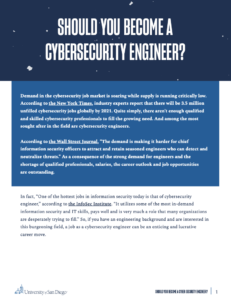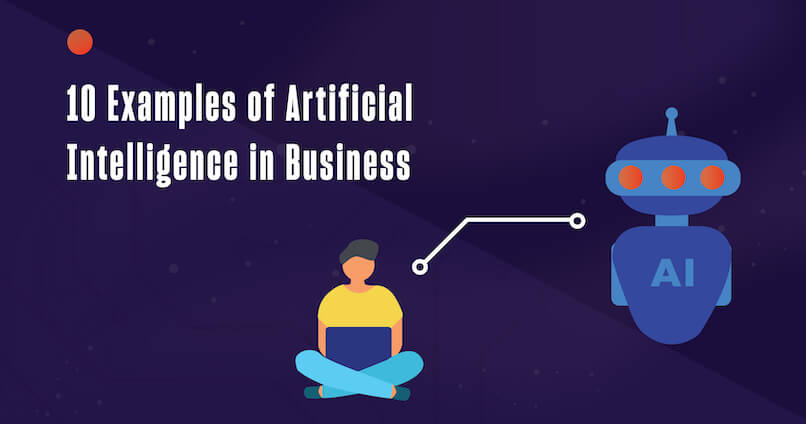Tips for Transitioning from General IT to Cybersecurity Engineering
News flash: Cybersecurity engineering is a dynamic, in-demand field that is attracting skilled professionals from across the world of information technology.
Faced with a severe cybersecurity engineering talent shortage, top employers across all industries are on the lookout for skilled professionals, including IT pros with the ability to expand their existing skills and utilize them with cybersecurity applications.
Add high salaries to the high demand, and it’s easy to see why many computer science and experienced tech technology professionals are transitioning from IT to cybersecurity. The fields of cybersecurity and information technology are closely related, even more so in recent years with many IT jobs demanding sharp focus on security issues.
There are also pathways into cybersecurity for those who lack a technical background but are willing to put some work into leveling up their knowledge, skills and resume.
If you are interested in transitioning into cybersecurity from an IT career, read on for key information and strategies for making the switch.
As you probably are already aware, key benefits of a career in cybersecurity include:
- High salaries — Employers across all industries are paying six-figure salaries for many key roles as they compete to hire skilled professionals.
- Strong career outlook — The S. Bureau of Labor Statistics is a bit behind the curve on tracking the fast-growing field of cybersecurity, but one of the most common jobs – information security analyst – has a 32% growth rate and pays an estimated $98,350.
- Zero unemployment — The demand for talented cybersecurity professionals exceeds the supply to such a significant degree that the field has an unemployment rate of 0%.
- Job security — “If you know cybersecurity, you have a job for life.” So says Robert Herjavec, CEO of Herjavec Group and panelist on ABC’s “Shark Tank.”
[RELATED] Which Cyber Security Program is Right For You? Download our free infographic to help decide >>
How to Get a Job in Cybersecurity Engineering
For those looking to make a career move from IT to cybersecurity engineering, education and experience emerge as two critically important factors. Cybersecurity employers are definitely looking for experience. Many organizations want to see at least three years of hands-on information security work on your resume.
The good news is that if you work in the information technology field, you’ve probably already got some solid, relevant experience under your belt. Seeking out educational opportunities is one way to help round out your experience and position yourself to compete for cybersecurity jobs.
When it comes to cybersecurity education, important options include obtaining an industry certification, earning an advanced degree or both. We’ll talk more about experience and education below, in addition to reviewing:
- Sought-after skills
- IT jobs that transition well to cybersecurity
- Cybersecurity career path options
- Transitioning to cybersecurity from a non-technical background
- Strategies for positioning yourself to join the cybersecurity workforce
[RELATED] Should You Become a Cybersecurity Engineer? >>
IT Jobs That Transition Well to Cybersecurity
Transitioning into the field of cybersecurity is possible from nearly any profession, especially when you consider opportunities not just in cybersecurity engineering but also on the operations and leadership side.
People working in the following types of jobs will likely possess experience that translates well to cybersecurity roles:
- Network Administrator
- Network Engineer
- Network Systems Admin
- Network Architect
- Network Support Specialist
- IT Technician
- IT Technical Support
- IT Customer Service
- Computer Programmer
- Software Engineer
- Software Developer
- System Administrator
- Systems Analyst
- Database Administrator
- Data Analyst
- Web Administrator
- Web Developer
- And more
[RELATED] Download Your Free Guide to Becoming a Cybersecurity Engineer >>
Sought-After Cybersecurity Engineering Skills
Roles and responsibilities differ from employer to employer, but some helpful technical skills include:
- IT fundamentals like system and web application administration
- Coding skills like Python C, C++, Java, Ruby, Perl, PHP
- Familiarity with network architecture, administration and operating systems
- Knowledge of database operations
Python is particularly important and will “give you an edge in your career” because it is used to assist in discovering and fixing vulnerabilities, according to Hackernoon.com.
So-called soft skills, especially writing and communication, are also a difference-maker. That’s because cybersecurity professionals, engineers included, are more in-demand if they can not only find and fix problems, but also effectively document their work in reports and white papers.
Strategies for Gaining Cybersecurity Experience
As mentioned earlier, employers everywhere are eager to hire people with cybersecurity experience. But since most cyber jobs require cyber experience, how do you get in the door?
Internships are one solid way to start building experience. Peer networking is invaluable too — for example, joining a local chapter of (ISC)², an international, nonprofit membership association for information security professionals.
Industry certifications are another vitally important part of the cybersecurity ecosystem, boosting both your knowledge and your profile to prospective employers. However, many of the top certifications require experience before you can apply to take the exam.
One important exception is the widely respected CompTIA Security+ credential, described as “a global certification that validates the baseline skills you need to perform core security functions and pursue an IT security career.” It is also a requirement for many federal cybersecurity jobs. Cybersecurity and information technology professionals alike can benefit from certification programs.
[RELATED] Download Your Free Guide to Becoming a Cybersecurity Engineer >>
How Education Can Help You Advance in Cybersecurity
Another pathway for gaining equivalent experience to enter the cybersecurity field is by earning your master’s degree. Chuck Bane, academic director of the University of San Diego’s online Master of Science in Cybersecurity Engineering, explains why.
Programs like the one offered at USD conduct intensive lab work — challenging students to conduct virtualization experiments that simulate real-world situations in a safe “sandbox” environment. Students learn to build systems, run scans and then analyze and act on the results, just as they would in many cybersecurity job roles.
The program culminates in an intensive capstone experience that is designed as a case study in which a class of students is hired as a team of “consultants.” They are tasked with a realistic simulation exercise that involves evaluating, analyzing and hardening the systems of a fictional multinational organization with offices in San Diego, London and Hong Kong, each location presenting a different set of regulations and potential threats.
The project requires them to generate comprehensive reports, documentation that can be used to demonstrate their experience to potential employers.
How to Transition to Cybersecurity from a Non-Technical Background
The master’s degree option, offered both on campus and online at USD, can also be extremely helpful for those seeking to transition into cybersecurity from a non-technical background.
For example, the USD program features an entry-level CYBR 505 course that effectively teaches the fundamentals of cybersecurity, from basic hardware and software to virtualization techniques, to those who lack an IT or technical foundation.
Reviewing the USD cybersecurity engineering master’s degree webpage is a good way to explore whether earning an advanced degree might align with your career goals.





